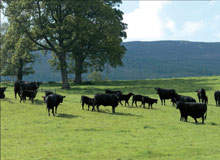
Hotels are increasingly having to prove their green credentials, with
“sustainability”, “carbon footprints” and “traceability” the buzz words of the
day. Certainly, when it comes to providing healthy and tasty cuisine, upmarket
hotels have always put a premium on quality.
And, for many guests in the UK these days, quality means organic. The Soil
Association is one of the UK’s most recognised trademarks for organic
produce, and guarantees that food meets strict welfare and environmental
standards. The body certifies more than 70% of the organic produce sold in the
UK.
WHY GO ORGANIC?
According to the association, organic is better for animals, for human
health and for the environment. As Soil Association director Patrick Holden
sees it: “An increasing body of science indicates there are higher vitamin,
mineral and trace elements in organic than non-organic food.” However, it is
also seasonal and comes at a cost.
The five-star Rocco Forte St David’s Hotel & Spa in Cardiff, Wales
champions the use of organic produce. Under the guidance of executive chef
Georg Fuchs, the 132-room and 20-suite hotel uses several suppliers. It sources
pork, chicken, lamb, beef and duck from the Cambrian Food Company, salt marsh
lamb from a salt marsh farmer, bread and vegetables from the Riverside Market
in Cardiff, and milk and yoghurt from Rachel’s Organic Dairy.
“If you buy local products in Wales, then these are often organic because
people take care of their animals and take a lot of pride in their product,”
explains Fuchs. “We buy organic because we want to promote Welsh produce
– and it is much better in flavour and healthier.
How well do you really know your competitors?
Access the most comprehensive Company Profiles on the market, powered by GlobalData. Save hours of research. Gain competitive edge.

Thank you!
Your download email will arrive shortly
Not ready to buy yet? Download a free sample
We are confident about the unique quality of our Company Profiles. However, we want you to make the most beneficial decision for your business, so we offer a free sample that you can download by submitting the below form
By GlobalData“If produce is grown in a glasshouse, and not in natural conditions, it
shows. I believe you have to get the best quality produce available and, for
me, buying organic helps a great deal.”
The Rocco Forte management is supportive of the kitchen’s use of
organic, despite it sometimes costing a little more. “In some cases it can be a
bit more expensive than buying industrially produced goods,” admits Fuchs. “But
I don’t approach it from that point of view. In my opinion it’s
better to pay a bit more and get produce that is of a very high standard.
“On average, the price is about 3% to 12% more than the industry price, but
where there is growing competition some products are actually cheaper.”
Fuchs is confident that customers are ready to pay more for a better
product. “If customers receive a product at a hotel, they expect the best
quality. I prefer a small portion of organic than a bigger portion of
non-organic so I can enjoy what nature gives me – it all depends on how
you appreciate food.”
However, the hotel’s kitchens are not 100% organic. “It’s not
possible to do this because of the variety of food that we produce in our hotel
– not everything is available,” he says.”Organic produce is also
seasonal, and our international guests expect certain foods to be available all
year round.”
While Fuchs is a committed fan, he is not certain everyone will follow in
his footsteps. “I expect there is always going to be a market for better
produce, and organic will play a big role in that, but there is also an
increase in demand. I think there may be more industrialisation to grow food in
a more modern and healthy way to meet that demand – not necessarily
organically.”
LOCAL PRODUCE
Not all hotels are opting for the organic route. At the Goring in London,
quality is paramount and chefs choose to buy their produce locally, but
don’t feel the need to buy organic. “In the hotel catering world
it’s not seen as hugely important at the moment, and you have to consider
the cost,” says former MD William Cowpe. “Our emphasis is on regional
foods.”
Larger chains such as Hilton UK hover at the edge of the market. “Hilton
does not intentionally source organic products at present, but we are
constantly reviewing the market,” says Hilton spokeswoman Elizabeth Le Coze.
“Where possible, we support British produce and government initiatives, and
source regional produce and specialities in the provinces.”
Knud Bundgaard, area chef for Hilton UK and Ireland, says the company was
100% behind organic produce, but didn’t have a policy across its
portfolio. “It’s something we encourage if it has relevance in particular
hotels, but what we focus on is sourcing local, fresh produce,” he
explains.
“Buying in a sustainable way is something that concerns me and sourcing
local produce is interesting for our guests. It’s something we should do
morally and it’s a revenue driver. It’s a sound business
decision.”
According to Bundgaard, national catering suppliers are being forced to
adapt to an increasing demand for local products, which in turn is improving
quality. The chef agrees that cost and availability are factors, and believes
that the organic market needs to resell itself to increase demand.
Specialist suppliers such as the Rhug Organic Estate in Denbighshire, Wales
are already seeing their client base grow. The estate supplies organic meat to
the hotel industry, including high-profile clients such as Le Manoir aux
Quat’Saison in Oxford and the Forbury in Reading. Both hotels have sent
representatives to the estate to review its procedures.
The 2,500-acre farm is fully certified by the Soil Association and sells
organic Aberdeen Angus Welsh lamb, Duroc pork, chicken and turkey. Its aim is
to protect the welfare of its animals and provide customers with healthy,
traceable and safe meat.
Philip Hughes, estate manager at Rhug, explains: “For hotels like Le Manoir
and Forbury, the traceability of the organic produce they source is very
important. They need to see that the customers are enjoying the flavour and the
produce, because then they will be willing to come back and pay the price on
the menus.”
He believes the popularity of organic products will rise: “It’s still
a niche market, but it is gathering momentum as customers decide they are
prepared to pay for organic.”
While cost is one stumbling block, another is availability. “At the moment
the level of availability just doesn’t exist,” concedes Hughes.
“The organic sector is not large enough or mature enough to meet
large-scale demands.”
But hoteliers tempted to cut corners should beware. Julie’s restaurant
in Holland Park, West London was recently fined £11,500 by Kensington and
Chelsea Council for serving standard chicken and meat, which it had described
on its menu as organic. A salutary tale for buyers as they weigh up just how
important organic produce will be to their customers in the 21st century.







